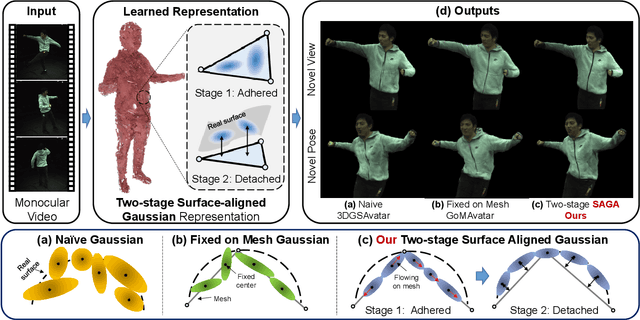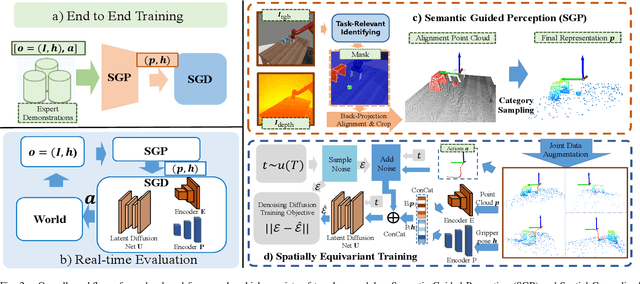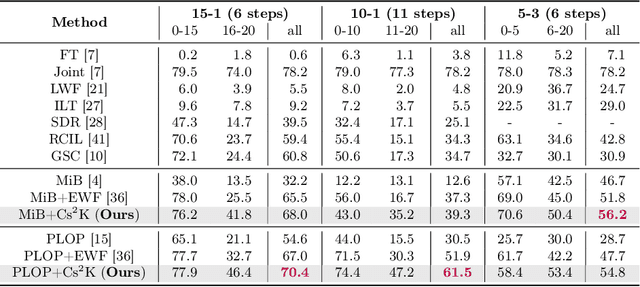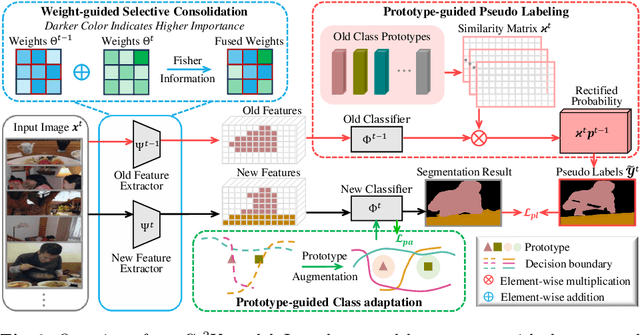Yang Cong
Senior Member, IEEE
Federated Multi-Task Clustering
Dec 30, 2025Abstract:Spectral clustering has emerged as one of the most effective clustering algorithms due to its superior performance. However, most existing models are designed for centralized settings, rendering them inapplicable in modern decentralized environments. Moreover, current federated learning approaches often suffer from poor generalization performance due to reliance on unreliable pseudo-labels, and fail to capture the latent correlations amongst heterogeneous clients. To tackle these limitations, this paper proposes a novel framework named Federated Multi-Task Clustering (i.e.,FMTC), which intends to learn personalized clustering models for heterogeneous clients while collaboratively leveraging their shared underlying structure in a privacy-preserving manner. More specifically, the FMTC framework is composed of two main components: client-side personalized clustering module, which learns a parameterized mapping model to support robust out-of-sample inference, bypassing the need for unreliable pseudo-labels; and server-side tensorial correlation module, which explicitly captures the shared knowledge across all clients. This is achieved by organizing all client models into a unified tensor and applying a low-rank regularization to discover their common subspace. To solve this joint optimization problem, we derive an efficient, privacy-preserving distributed algorithm based on the Alternating Direction Method of Multipliers, which decomposes the global problem into parallel local updates on clients and an aggregation step on the server. To the end, several extensive experiments on multiple real-world datasets demonstrate that our proposed FMTC framework significantly outperforms various baseline and state-of-the-art federated clustering algorithms.
OpenVLN: Open-world aerial Vision-Language Navigation
Nov 09, 2025Abstract:Vision-language models (VLMs) have been widely-applied in ground-based vision-language navigation (VLN). However, the vast complexity of outdoor aerial environments compounds data acquisition challenges and imposes long-horizon trajectory planning requirements on Unmanned Aerial Vehicles (UAVs), introducing novel complexities for aerial VLN. To address these challenges, we propose a data-efficient Open-world aerial Vision-Language Navigation (i.e., OpenVLN) framework, which could execute language-guided flight with limited data constraints and enhance long-horizon trajectory planning capabilities in complex aerial environments. Specifically, we reconfigure a reinforcement learning framework to optimize the VLM for UAV navigation tasks, which can efficiently fine-tune VLM by using rule-based policies under limited training data. Concurrently, we introduce a long-horizon planner for trajectory synthesis that dynamically generates precise UAV actions via value-based rewards. To the end, we conduct sufficient navigation experiments on the TravelUAV benchmark with dataset scaling across diverse reward settings. Our method demonstrates consistent performance gains of up to 4.34% in Success Rate, 6.19% in Oracle Success Rate, and 4.07% in Success weighted by Path Length over baseline methods, validating its deployment efficacy for long-horizon UAV navigation in complex aerial environments.
TMUAD: Enhancing Logical Capabilities in Unified Anomaly Detection Models with a Text Memory Bank
Aug 29, 2025Abstract:Anomaly detection, which aims to identify anomalies deviating from normal patterns, is challenging due to the limited amount of normal data available. Unlike most existing unified methods that rely on carefully designed image feature extractors and memory banks to capture logical relationships between objects, we introduce a text memory bank to enhance the detection of logical anomalies. Specifically, we propose a Three-Memory framework for Unified structural and logical Anomaly Detection (TMUAD). First, we build a class-level text memory bank for logical anomaly detection by the proposed logic-aware text extractor, which can capture rich logical descriptions of objects from input images. Second, we construct an object-level image memory bank that preserves complete object contours by extracting features from segmented objects. Third, we employ visual encoders to extract patch-level image features for constructing a patch-level memory bank for structural anomaly detection. These three complementary memory banks are used to retrieve and compare normal images that are most similar to the query image, compute anomaly scores at multiple levels, and fuse them into a final anomaly score. By unifying structural and logical anomaly detection through collaborative memory banks, TMUAD achieves state-of-the-art performance across seven publicly available datasets involving industrial and medical domains. The model and code are available at https://github.com/SIA-IDE/TMUAD.
SAGA: Surface-Aligned Gaussian Avatar
Dec 01, 2024



Abstract:This paper presents a Surface-Aligned Gaussian representation for creating animatable human avatars from monocular videos,aiming at improving the novel view and pose synthesis performance while ensuring fast training and real-time rendering. Recently,3DGS has emerged as a more efficient and expressive alternative to NeRF, and has been used for creating dynamic human avatars. However,when applied to the severely ill-posed task of monocular dynamic reconstruction, the Gaussians tend to overfit the constantly changing regions such as clothes wrinkles or shadows since these regions cannot provide consistent supervision, resulting in noisy geometry and abrupt deformation that typically fail to generalize under novel views and poses.To address these limitations, we present SAGA,i.e.,Surface-Aligned Gaussian Avatar,which aligns the Gaussians with a mesh to enforce well-defined geometry and consistent deformation, thereby improving generalization under novel views and poses. Unlike existing strict alignment methods that suffer from limited expressive power and low realism,SAGA employs a two-stage alignment strategy where the Gaussians are first adhered on while then detached from the mesh, thus facilitating both good geometry and high expressivity. In the Adhered Stage, we improve the flexibility of Adhered-on-Mesh Gaussians by allowing them to flow on the mesh, in contrast to existing methods that rigidly bind Gaussians to fixed location. In the second Detached Stage, we introduce a Gaussian-Mesh Alignment regularization, which allows us to unleash the expressivity by detaching the Gaussians but maintain the geometric alignment by minimizing their location and orientation offsets from the bound triangles. Finally, since the Gaussians may drift outside the bound triangles during optimization, an efficient Walking-on-Mesh strategy is proposed to dynamically update the bound triangles.
Learning Generalizable 3D Manipulation With 10 Demonstrations
Nov 15, 2024



Abstract:Learning robust and generalizable manipulation skills from demonstrations remains a key challenge in robotics, with broad applications in industrial automation and service robotics. While recent imitation learning methods have achieved impressive results, they often require large amounts of demonstration data and struggle to generalize across different spatial variants. In this work, we present a novel framework that learns manipulation skills from as few as 10 demonstrations, yet still generalizes to spatial variants such as different initial object positions and camera viewpoints. Our framework consists of two key modules: Semantic Guided Perception (SGP), which constructs task-focused, spatially aware 3D point cloud representations from RGB-D inputs; and Spatial Generalized Decision (SGD), an efficient diffusion-based decision-making module that generates actions via denoising. To effectively learn generalization ability from limited data, we introduce a critical spatially equivariant training strategy that captures the spatial knowledge embedded in expert demonstrations. We validate our framework through extensive experiments on both simulation benchmarks and real-world robotic systems. Our method demonstrates a 60 percent improvement in success rates over state-of-the-art approaches on a series of challenging tasks, even with substantial variations in object poses and camera viewpoints. This work shows significant potential for advancing efficient, generalizable manipulation skill learning in real-world applications.
Cs2K: Class-specific and Class-shared Knowledge Guidance for Incremental Semantic Segmentation
Jul 12, 2024



Abstract:Incremental semantic segmentation endeavors to segment newly encountered classes while maintaining knowledge of old classes. However, existing methods either 1) lack guidance from class-specific knowledge (i.e., old class prototypes), leading to a bias towards new classes, or 2) constrain class-shared knowledge (i.e., old model weights) excessively without discrimination, resulting in a preference for old classes. In this paper, to trade off model performance, we propose the Class-specific and Class-shared Knowledge (Cs2K) guidance for incremental semantic segmentation. Specifically, from the class-specific knowledge aspect, we design a prototype-guided pseudo labeling that exploits feature proximity from prototypes to correct pseudo labels, thereby overcoming catastrophic forgetting. Meanwhile, we develop a prototype-guided class adaptation that aligns class distribution across datasets via learning old augmented prototypes. Moreover, from the class-shared knowledge aspect, we propose a weight-guided selective consolidation to strengthen old memory while maintaining new memory by integrating old and new model weights based on weight importance relative to old classes. Experiments on public datasets demonstrate that our proposed Cs2K significantly improves segmentation performance and is plug-and-play.
MuseumMaker: Continual Style Customization without Catastrophic Forgetting
Apr 29, 2024



Abstract:Pre-trained large text-to-image (T2I) models with an appropriate text prompt has attracted growing interests in customized images generation field. However, catastrophic forgetting issue make it hard to continually synthesize new user-provided styles while retaining the satisfying results amongst learned styles. In this paper, we propose MuseumMaker, a method that enables the synthesis of images by following a set of customized styles in a never-end manner, and gradually accumulate these creative artistic works as a Museum. When facing with a new customization style, we develop a style distillation loss module to extract and learn the styles of the training data for new image generation. It can minimize the learning biases caused by content of new training images, and address the catastrophic overfitting issue induced by few-shot images. To deal with catastrophic forgetting amongst past learned styles, we devise a dual regularization for shared-LoRA module to optimize the direction of model update, which could regularize the diffusion model from both weight and feature aspects, respectively. Meanwhile, to further preserve historical knowledge from past styles and address the limited representability of LoRA, we consider a task-wise token learning module where a unique token embedding is learned to denote a new style. As any new user-provided style come, our MuseumMaker can capture the nuances of the new styles while maintaining the details of learned styles. Experimental results on diverse style datasets validate the effectiveness of our proposed MuseumMaker method, showcasing its robustness and versatility across various scenarios.
Marrying NeRF with Feature Matching for One-step Pose Estimation
Apr 01, 2024



Abstract:Given the image collection of an object, we aim at building a real-time image-based pose estimation method, which requires neither its CAD model nor hours of object-specific training. Recent NeRF-based methods provide a promising solution by directly optimizing the pose from pixel loss between rendered and target images. However, during inference, they require long converging time, and suffer from local minima, making them impractical for real-time robot applications. We aim at solving this problem by marrying image matching with NeRF. With 2D matches and depth rendered by NeRF, we directly solve the pose in one step by building 2D-3D correspondences between target and initial view, thus allowing for real-time prediction. Moreover, to improve the accuracy of 2D-3D correspondences, we propose a 3D consistent point mining strategy, which effectively discards unfaithful points reconstruted by NeRF. Moreover, current NeRF-based methods naively optimizing pixel loss fail at occluded images. Thus, we further propose a 2D matches based sampling strategy to preclude the occluded area. Experimental results on representative datasets prove that our method outperforms state-of-the-art methods, and improves inference efficiency by 90x, achieving real-time prediction at 6 FPS.
Never-Ending Embodied Robot Learning
Mar 01, 2024



Abstract:Relying on large language models (LLMs), embodied robots could perform complex multimodal robot manipulation tasks from visual observations with powerful generalization ability. However, most visual behavior-cloning agents suffer from manipulation performance degradation and skill knowledge forgetting when adapting into a series of challenging unseen tasks. We here investigate the above challenge with NBCagent in embodied robots, a pioneering language-conditioned Never-ending Behavior-Cloning agent, which can continually learn observation knowledge of novel robot manipulation skills from skill-specific and skill-shared attributes. Specifically, we establish a skill-specific evolving planner to perform knowledge decoupling, which can continually embed novel skill-specific knowledge in our NBCagent agent from latent and low-rank space. Meanwhile, we propose a skill-shared semantics rendering module and a skill-shared representation distillation module to effectively transfer anti-forgetting skill-shared knowledge, further tackling catastrophic forgetting on old skills from semantics and representation aspects. Finally, we design a continual embodied robot manipulation benchmark, and several expensive experiments demonstrate the significant performance of our method. Visual results, code, and dataset are provided at: https://neragent.github.io.
Create Your World: Lifelong Text-to-Image Diffusion
Sep 08, 2023Abstract:Text-to-image generative models can produce diverse high-quality images of concepts with a text prompt, which have demonstrated excellent ability in image generation, image translation, etc. We in this work study the problem of synthesizing instantiations of a use's own concepts in a never-ending manner, i.e., create your world, where the new concepts from user are quickly learned with a few examples. To achieve this goal, we propose a Lifelong text-to-image Diffusion Model (L2DM), which intends to overcome knowledge "catastrophic forgetting" for the past encountered concepts, and semantic "catastrophic neglecting" for one or more concepts in the text prompt. In respect of knowledge "catastrophic forgetting", our L2DM framework devises a task-aware memory enhancement module and a elastic-concept distillation module, which could respectively safeguard the knowledge of both prior concepts and each past personalized concept. When generating images with a user text prompt, the solution to semantic "catastrophic neglecting" is that a concept attention artist module can alleviate the semantic neglecting from concept aspect, and an orthogonal attention module can reduce the semantic binding from attribute aspect. To the end, our model can generate more faithful image across a range of continual text prompts in terms of both qualitative and quantitative metrics, when comparing with the related state-of-the-art models. The code will be released at https://wenqiliang.github.io/.
 Add to Chrome
Add to Chrome Add to Firefox
Add to Firefox Add to Edge
Add to Edge